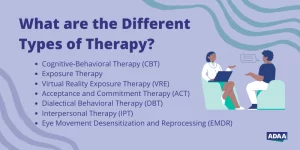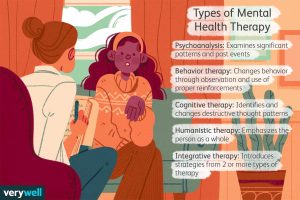Examples of Therapeutic Therapy: Enhancing Mental and Emotional Well-being
Introduction
Therapeutic therapy encompasses a broad range of approaches aimed at improving mental and emotional well-being. It involves various techniques and interventions that promote self-reflection, personal growth, and healing. Therapeutic therapy is utilized by trained professionals to address a wide range of mental health issues, including anxiety, depression, trauma, and relationship difficulties. In this article, we will explore some examples of therapeutic therapies and their potential benefits.
Cognitive-Behavioral Therapy (CBT)
Overview
Cognitive-Behavioral Therapy (CBT) is a widely recognized and extensively researched therapeutic approach. It focuses on identifying and modifying negative thought patterns and behaviors that contribute to distressing emotions. By working collaboratively with a therapist, individuals can gain insight into their thinking patterns and learn healthier ways to cope with challenges.
Benefits
CBT has shown great effectiveness in treating various mental health conditions, such as anxiety disorders, depression, and post-traumatic stress disorder (PTSD). It equips individuals with practical skills to challenge negative thoughts, manage stress, and develop healthier behaviors. CBT is often time-limited, making it a practical and goal-oriented therapy option for many people.

Eye Movement Desensitization and Reprocessing (EMDR)
Overview
Eye Movement Desensitization and Reprocessing (EMDR) is a specialized form of therapy primarily used to treat trauma-related disorders. It involves the use of bilateral stimulation, such as eye movements or taps, to facilitate the processing of traumatic memories and reduce their emotional intensity.
Benefits
EMDR has been found to be highly effective in reducing symptoms of post-traumatic stress disorder (PTSD) and other trauma-related conditions. It helps individuals reprocess distressing memories, allowing them to heal from the emotional wounds associated with past traumatic experiences. EMDR can also enhance self-esteem and promote emotional resilience.
Acceptance and Commitment Therapy (ACT)
Overview
Acceptance and Commitment Therapy (ACT) is a mindfulness-based approach that focuses on accepting one’s thoughts and feelings while committing to actions aligned with personal values. It encourages individuals to be present in the moment and engage in behaviors that enrich their lives, even in the presence of emotional difficulties.
Benefits
ACT has been successful in treating various mental health conditions, including anxiety, depression, and chronic pain. By fostering psychological flexibility, ACT helps individuals develop a healthier relationship with their thoughts and emotions. It empowers them to make conscious choices that align with their values, leading to a more fulfilling life.
Psychodynamic Therapy
Overview
Psychodynamic therapy is an insight-oriented approach that explores the unconscious processes and unresolved conflicts that contribute to an individual’s current difficulties. By examining past experiences and relationships, individuals can gain a deeper understanding of their emotions, behaviors, and relationship patterns.
Benefits
Psychodynamic therapy can be beneficial for individuals seeking to develop self-awareness, improve self-esteem, and enhance interpersonal relationships. It helps individuals uncover and process underlying emotional conflicts, facilitating personal growth and psychological healing. This therapy can address a wide range of mental health concerns, including anxiety, depression, and personality disorders.
Group Therapy
Overview
Group therapy involves a therapist-facilitated gathering of individuals facing similar challenges or mental health issues. It provides a supportive and empathetic environment where individuals can share experiences, gain insights, and receive feedback from both the therapist and other group members.

Benefits
Group therapy offers numerous benefits, including a sense of belonging and connection with others who can relate to their experiences. It provides a space for individuals to receive support, validation, and different perspectives. Group therapy also promotes social skills development, empathy, and a sense of community. It is particularly useful for individuals struggling with relationship issues, addiction, and interpersonal difficulties.
Art Therapy
Overview
Art therapy utilizes various forms of artistic expression, such as painting, drawing, and sculpture, as a means of communication and self-exploration. It allows individuals to tap into their creativity and use art as a medium to process emotions, gain insights, and foster self-discovery.
Benefits
Art therapy can be beneficial for individuals who struggle to express themselves verbally or find it difficult to articulate their emotions. Engaging in art-making can promote relaxation, stress reduction, and emotional healing. It provides a non-threatening and non-judgmental space for individuals to explore their inner world, enhance self-esteem, and develop self-awareness.
Mindfulness-Based Stress Reduction (MBSR)
Overview
Mindfulness-Based Stress Reduction (MBSR) is an evidence-based therapy that combines mindfulness meditation, body awareness, and yoga. It involves cultivating present-moment awareness and non-judgmental acceptance of thoughts, sensations, and emotions.
Benefits
MBSR has shown effectiveness in reducing stress, anxiety, and symptoms of depression. It helps individuals develop a greater capacity to cope with challenges, regulate their emotions, and improve overall well-being. MBSR also encourages self-care practices and enhances self-compassion.
Conclusion
Therapeutic therapy encompasses a diverse range of approaches aimed at improving mental and emotional well-being. The examples discussed in this article, such as Cognitive-Behavioral Therapy (CBT), Eye Movement Desensitization and Reprocessing (EMDR), Acceptance and Commitment Therapy (ACT), Psychodynamic Therapy, Group Therapy, Art Therapy, and Mindfulness-Based Stress Reduction (MBSR), showcase the breadth and depth of therapeutic interventions available. For therapeutic support see here.
Each therapy approach offers unique benefits, tailored to address specific mental health concerns and individual needs. It is important to remember that therapy is a highly personalized process, and what works for one person may not work for another. Therefore, finding the right therapeutic therapy and working with a trained professional is crucial for optimal outcomes.
If you are considering therapy, consult with a mental health professional who can guide you in selecting the most appropriate therapeutic approach for your specific situation. Remember, therapy can be a transformative journey towards self-discovery, healing, and improved mental and emotional well-being.

